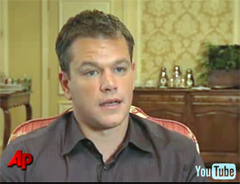
The people who are supposed to tell the truth are the ones widely suspected of making things up. The ones who make things up for a living are the ones with political credibility.
And the people who are supposed to have the public's best interests in mind are suspected of being self-interested. The people in the business of being self-interested, vain and out to make a profit at people's expense are those credited with altruism.
These paradoxes and more, courtesy the U.S. election.
How many Americans have faith that their president and his henchmen are there to protect them and tell the truth -- well, other than Britney Spears? How many believe that the current mortgage disaster and yesterday's Wall Street crash, for example, were inevitable, that the politicians were knowledgeable and did everything possible to protect the average American?
On the other hand, how many people have faith in Hollywood actors' knowledge of politics and commitment to social justice? Lots, apparently.
I'm not a politician, but I play one on TV
The Vancouver Sun's story about Annette Bening criticizing Sarah Palin received 498,000 views, which, according to managing editor Kirk LaPointe, is the largest single story they've ever had.
Matt Damon's criticism of Sarah Palin's lack of experience and political knowledge has drawn over 4.1 millions viewers on YouTube, more than 50,000 comments, and more than 200 response videos.
Barbara Streisand's two recent Huffington Post blogs, Is This a Democracy or a Monarchy? and The Country Can't Afford to Elect John McCain were among their top stories of the day both times.
The announcement that Brad Pitt had donated $100,000 to fight California's Proposition 8 (to ban gay marriage) was a top story on Us weekly.
Of course, Tina Fey's two parodies of Sarah Palin, including the most recent one, which drew millions of viewers on air and 2.4 million views online, have been the most talked about pop culture item each week and put SNL's viewership up 52 per cent since the same time last year.
It isn't new, of course, that actors are weighing in on politics. And there is more fascination with celebrities than ever before, which explains some of the appeal. But the scale of the public interest in actors' and comedians' political knowledge and opinions does raise some questions.
'I can see Russia...'
Here's another paradox: The people whose jobs are to be well informed don't really seem to be. And vice versa.
Politicians, for one, can seem a little under-informed -- Sarah Palin's recent interview with Katie Couric suggests she might have a slight lack of knowledge when it comes to foreign policy and economics, there's the rumour that she can't name a Supreme Court case other than Roe V. Wade.
And journalists, for another. Did anyone else think that Couric maybe didn't run the sharpest interview? Never mind that Fox’s and CNN's coverage of the election often seem even less comprehensive than that of the tabloids'.
In the court of public opinion, the jesters rule
The New York Times Magazine recently ran a piece about how Jon Stewart is the most trusted man in America when it comes to political opinion. And asked if Tina Fey went too far, one commenter replied, "Tina Fey did NOT go too far. She fulfilled a responsibility as a comedian of today." Topsy-turvy roles are in vogue.
Which brings us to another paradox -- the U.S. has millions of smart, knowledgeable women, but two of the most high profile women right now -- Sarah Palin and Katie Couric -- who do jobs whose primary requirements are smarts and knowledge, tend to come off as cute and a bit light upstairs.
I'm sure there's a rational, simple, intelligent explanation for all of this: maybe it's something to do with the rise of TV as our dominant medium, with its emphasis on superficiality, (didn't Marshall McLuhan warn us about this?), which has been further fragmented through the prism of the Internet. Maybe it’s that smart people find ways to manipulate any situation to their advantage, and some of those people don’t have lofty ideas like the common good in mind. Or maybe it’s that in times of chaos, old patterns are dislodged, by definition, and people look for simple order again, even when it’s false, and then that seemingly simple, disordered state becomes entrenched as the new reality even though it flies in the face of logic or sense.
But then, how would I know? I'm just a journalist and not a Hollywood actor or comedian, so I can't be expected to understand it all.
Related Tyee stories:
- Tina Fey for Vice President
If the election is a made-for-TV event, why not get a pro? - All-Schiavo TV
The latest media sensation is news for people who don’t like news. - What Sarah Palin Shows
Sexism and racism alive and well in US politics.
Read more: Politics














Tyee Commenting Guidelines
Comments that violate guidelines risk being deleted, and violations may result in a temporary or permanent user ban. Maintain the spirit of good conversation to stay in the discussion.
*Please note The Tyee is not a forum for spreading misinformation about COVID-19, denying its existence or minimizing its risk to public health.
Do:
Do not: